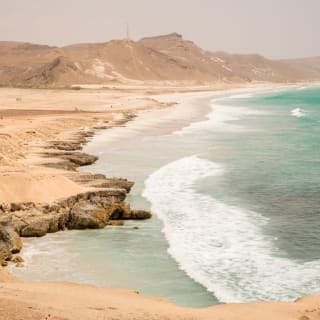
Safe and Well-Prepared for Your Trip
For many travelers, access to quality healthcare is a crucial factor when choosing a destination – and Oman offers a pleasant surprise. In recent years, the Sultanate has developed an impressive healthcare system comparable to Western standards in many aspects. From modern emergency clinics in cities and well-stocked pharmacies to international professionals, Oman provides visitors with comprehensive, high-quality medical care. Even in remote areas, there are options for initial medical support, ensuring travelers receive timely assistance in case of emergencies.
In this article, you’ll find essential information on medical care in Oman, from accessing modern clinics and the availability of common medications to important travel preparation tips. Gain valuable insights and practical advice to help make your stay in Oman safe and worry-free.
High Standards of Medical Care for Discerning Travelers
Oman’s healthcare sector has undergone remarkable growth over the past few decades, resulting in a comprehensive system that includes both public and private facilities. The Omani government continues to invest in this area to maintain high-quality, accessible healthcare – a critical point for discerning individual travelers. Free healthcare access for Omani citizens, an extensive network of healthcare facilities, and advanced medical technologies are just a few factors that position Oman as a healthcare leader in the Middle East.
Quality and Infrastructure of the Healthcare System
Oman’s healthcare infrastructure is carefully designed for efficiency and high standards. Health centers in rural areas and specialized hospitals in cities form a nationwide network that ensures comprehensive care. Oman emphasizes prevention, conducting regular health education campaigns and vaccination programs. The training of local medical personnel is also prioritized to maintain high care standards in the long term. Thanks to these efforts, Oman stands out in the region: the life expectancy is above the Gulf state average, and the infant mortality rate is among the lowest in the region.
Modern Medical Facilities and Hospitals
In Oman, travelers can access modern, well-equipped medical facilities that often meet Western standards. Especially in larger cities like Muscat, travelers can rely on high-quality care and advanced medical technology. Many doctors and specialists in Oman have international qualifications, ensuring that even complex medical treatments can be conducted within the country. Most hospitals and clinics have English-speaking staff, making communication easier for international visitors. Private clinics and hospitals also offer a particularly high standard of comfort and service, shorter wait times, and a wide range of modern treatment methods. This commitment to high-quality, accessible care makes Oman an attractive destination where individual travelers can rely on top-tier healthcare.
Oman is also establishing itself as a destination for medical tourism through continuous investments and an efficient emergency system. This dedication to high-quality, widespread care makes the country an appealing choice, where individual travelers can rely on first-rate health services.
International Standards and Availability of Specialists
Oman has made significant progress in healthcare and continues to work towards meeting international standards. This is particularly relevant for discerning travelers, as the country offers accredited hospitals, qualified staff, and specialized care.
Accreditation and International Comparability
Several leading hospitals in Oman hold international accreditations, meeting global standards. Muscat’s Royal Hospital and Sultan Qaboos University Hospital are accredited by the Joint Commission International (JCI), one of the world’s most respected accreditation bodies. The Khoula Hospital, known for trauma care, and Al Nahda Hospital, specializing in ophthalmology and ENT services, also meet JCI’s high standards.
In many respects, Oman’s medical facilities match Western standards. The latest treatment protocols are followed, modern equipment is available, and patient safety is prioritized through strict hygiene and infection control measures. For travelers, these facilities often offer shorter wait times and efficient service, which is advantageous for planned treatments. These international accreditations reinforce confidence in the quality of care, making Oman a reliable choice for travelers seeking high-quality medical treatment.
Doctors and Specialists in Remote Areas
In Oman’s rural and remote regions, the availability of specialists presents a unique challenge. While urban areas have ample qualified specialists, basic healthcare in remote areas is mainly provided by general practitioners. Health centers in these areas cover primary care and can refer patients to specialized facilities as needed.
To enhance medical services in these regions, Oman increasingly relies on mobile clinics and telemedicine. Mobile clinics allow specialists to visit remote areas regularly, providing targeted treatments. Telemedicine is also gaining traction: through digital consultations, local doctors can access specialists’ knowledge from larger cities, improving care quality in remote areas. The government also offers incentives for professionals willing to work in rural regions and continually invests in expanding healthcare infrastructure. These measures ensure that even travelers in remote areas have access to qualified medical personnel and stable basic care.
Preparation and Precautions Before Traveling to Oman
Good preparation is key to ensuring a safe and carefree trip to Oman. Along with essential vaccinations and health precautions, securing appropriate travel health insurance is crucial. These steps help travelers minimize health risks and be well-prepared in case of emergencies.
Vaccination Recommendations and Specific Precautions
For travel to Oman, some standard and travel-specific vaccinations are recommended. These include routine vaccines like Tetanus-Diphtheria, Measles-Mumps-Rubella, and Polio, which should be updated as needed. For travelers with specific exposure risks or extended stays, Hepatitis A and B, Typhoid, and Rabies vaccinations may be advisable. Although most of Oman is malaria-free, mosquito protection is recommended in certain southern regions like Dhofar. Insect repellent and long clothing are effective ways to minimize the risk of insect bites.
Additional health precautions include daily sun protection, as Oman’s sun can be intense. High-SPF sunscreen, a hat, and adequate hydration are essential to prevent heat-related issues. Hygiene is also important: regular handwashing, using sanitizers, and being cautious with food and water help prevent illness. For personalized advice, travelers should consult a travel medicine clinic before their trip to receive recommendations based on their health and travel itinerary.
Travel Health Insurance and Emergency Plans
Comprehensive travel health insurance is essential for travelers to Oman, covering not only medical treatment costs but also medical evacuation if needed. Multilingual emergency support, coverage for rescue costs, and coverage for pre-existing conditions are key aspects of good insurance. It’s advisable to review insurance coverage to ensure it includes activities like diving or desert tours, which are popular in Oman.
Having an emergency plan in place provides additional peace of mind. This includes having local emergency numbers handy, such as police (9999) and ambulance services (9999), and carrying important documents like copies of your passport. Travelers should know the locations of nearby hospitals, such as the Royal Hospital and Khoula Hospital in Muscat. A well-stocked travel medical kit, including personal medications, pain relievers, insect repellent, and a first-aid kit, adds further convenience in emergencies. With these precautions, individual travelers can enjoy their trip to Oman with confidence, knowing they are well-prepared for any health-related situations.
Emergency Care and Safety in Oman
Oman has a reliable emergency medical system, especially in major cities and tourist centers. For those venturing into more remote areas, taking additional precautions is advisable to ensure they are prepared in case of emergencies. From modern emergency clinics to well-stocked pharmacies, Oman’s healthcare system offers a strong foundation to safeguard visitors’ well-being.
Emergency Clinics and Accessibility
In cities like Muscat, Salalah, and Sohar, travelers can find well-equipped hospitals and emergency clinics that operate 24/7 with experienced medical staff. These urban centers often have many English-speaking professionals, making communication in emergencies easier. For travelers exploring Oman’s remote deserts and mountains, however, it’s important to note that smaller towns typically have health centers with limited emergency capabilities, and the nearest fully equipped clinic can be hours away.
Travel times in remote areas can be lengthy, and road conditions may complicate rescue efforts. Popular desert camps often have basic first aid supplies, and air transport is frequently arranged for serious emergencies to ensure faster assistance. Knowing the locations of the nearest emergency clinics and having the emergency number 9999 handy is especially important.
Medications and Pharmacies
Medication availability in Oman is generally excellent, particularly in urban areas. In cities like Muscat, Salalah, and Sohar, there are numerous pharmacies offering a wide range of over-the-counter and prescription medications. Pain relievers like paracetamol and ibuprofen, antihistamines, and medications for digestive issues are readily available. Many pharmacies in larger cities operate 24/7 and often have English-speaking staff, making it easier for international visitors to make purchases.
In rural areas, however, the selection of medications may be limited. Travelers with specific medical needs should bring enough supplies, along with copies of their prescriptions and generic names for the required medications. Prescription medications, such as antibiotics and certain pain relievers, require a prescription. Some medications that might be available over the counter in a traveler’s home country may be strictly regulated in Oman. Travelers with chronic conditions should check in advance whether their medications are allowed in Oman or if alternatives are necessary.
Oman offers a dependable system for emergency care and pharmacies, yet thorough preparation is essential to ensure that necessary medications are accessible even in remote areas.
Discover Oman with experts who have called it their home
Your dream holiday, tailor-made by experts.
We don't just know Oman from books, we visit the country several times a year to experience the culture, landscape and people first-hand.
From your first enquiry to your return home, we are there for you personally - by phone, email or WhatsApp, whenever you need us. Our trips are as unique as you are: individually planned and provided with exclusive privileges and high-quality arrangements that will make your trip unforgettable.
Experts for your Oman trip









